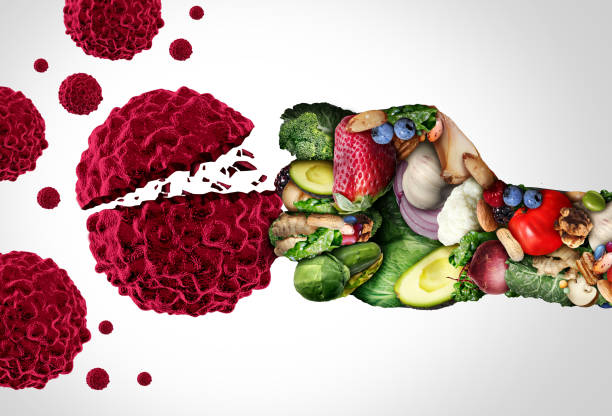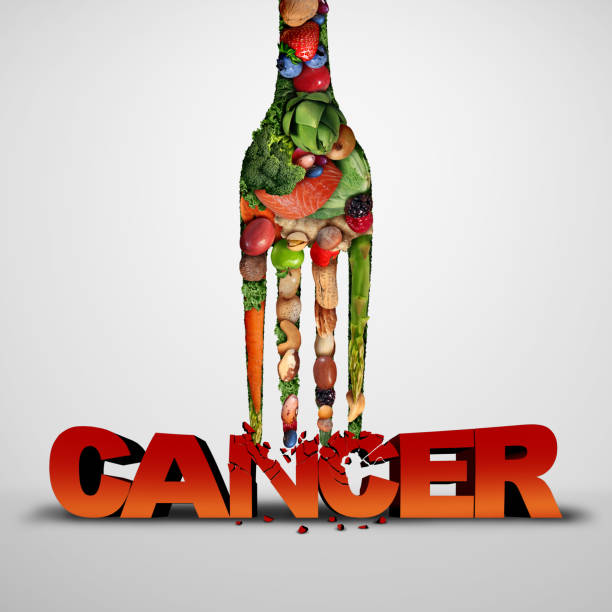The very word evokes fear and uncertainty. While Nutrition in Cancer Prevention have been made in treatment, prevention remains a crucial weapon in this ongoing fight. Fortunately, research increasingly reveals the profound impact of nutrition in cancer prevention. This article delves into the fascinating science behind food and its power to empower our bodies to resist the development of this disease.
The Hallmarks of Cancer: Nutrition in Cancer Prevention

Cancer isn’t a single disease, but rather a collection of abnormal cell growth processes. These out-of-control cells defy the body’s natural order, dividing uncontrollably and forming tumors. To understand how nutrition in cancer prevention works, we need to grasp the hallmarks of cancer. These hallmarks encompass various cellular derangements, including:
- Sustained proliferative signaling: Healthy cells tightly regulate their growth. In cancer, this control is lost, leading to uncontrolled division.
- Evading growth suppressors: The body has natural brakes on cell growth. Cancer cells develop mechanisms to bypass these brakes.
- Resisting cell death: Apoptosis, or programmed cell death, eliminates damaged or unwanted cells. Cancer cells evade this process.
- Enabling replicative immortality: Normal cells have a limited lifespan. Cancer cells acquire the ability to divide indefinitely.
- Inducing angiogenesis: Tumors need a blood supply to grow. Cancer cells promote the formation of new blood vessels to nourish themselves.
- Activating invasion and metastasis: Cancer cells can invade surrounding tissues and migrate to distant parts of the body, forming secondary tumors (metastasis).
The Food-Body Connection: Nutrition in Cancer Prevention
Nutrition in cancer prevention hinges on the intricate relationship between food and our cellular machinery. The trillions of cells in our body rely on nutrients from food for growth, repair, and function. But how exactly does what we eat influence cancer development? Here’s a closer look:
- Antioxidants: These powerful molecules combat free radicals, unstable molecules that damage DNA and can trigger uncontrolled cell growth. Fruits and vegetables are rich in antioxidants like vitamins A, C, and E, which help protect cells from free radical damage.
- Phytonutrients: These plant-based compounds possess various health benefits. Some phytonutrients may interfere with the development of cancer by inhibiting angiogenesis or promoting cell death in abnormal cells. Examples include curcumin in turmeric and sulforaphane in cruciferous vegetables.
- Fiber: Dietary fiber promotes a healthy gut microbiome, the community of microorganisms residing in our intestines. A balanced gut microbiome plays a crucial role in immune function and may influence cancer risk. Fiber also helps regulate blood sugar levels, as chronically high blood sugar has been linked to an increased risk of certain cancers.
The Power of Plants: A Rainbow on Your Plate
Nutrition in cancer prevention emphasizes the importance of a plant-based diet. Fruits, vegetables, and whole grains are the cornerstones of a cancer-protective eating pattern. Here’s why:
- Variety is Key: Different plant foods offer a diverse range of beneficial nutrients and phytonutrients. Aim for a rainbow on your plate, incorporating a variety of colors from fruits and vegetables like leafy greens, berries, tomatoes, and cruciferous vegetables like broccoli and cauliflower.
- Fiber Fanatics: Include whole grains like brown rice, quinoa, and whole-wheat bread in your diet. These foods are rich in fiber, which promotes gut health and helps regulate blood sugar levels.
- Go Green: Leafy greens like spinach and kale are packed with vitamins, minerals, and antioxidants. Aim for several servings of these green powerhouses each week.
The Protein Conundrum: Balancing Needs and Risks
Protein is essential for building and repairing tissues. However, the source of protein can influence cancer risk. Here’s why:
- Moderation is Key: While protein is necessary, excessive red and processed meat consumption has been linked to an increased risk of certain cancers. Aim for moderate portions of lean protein sources like poultry, fish, and legumes.
- Plant-Based Powerhouses: Consider incorporating more plant-based protein sources like beans, lentils, and tofu into your diet. These foods are packed with fiber and other beneficial nutrients, offering a cancer-protective advantage.
Fat Facts: Choosing Wisely for Cellular Health

Not all fats are created equal. While some fats are essential for health, others can contribute to inflammation and potentially increase cancer risk. Here’s a breakdown:
- Limit Saturated and Trans Fats: Saturated fats, found in red meat and dairy products, and trans fats, found in processed foods, should be limited in a cancer-preventive diet. These fats can contribute to inflammation.
- Embrace the Unsaturated Options: Unsaturated fats, particularly monounsaturated fats found in olive oil and avocados, and polyunsaturated fats found in fatty
Unsaturated fats, particularly monounsaturated fats found in olive oil and avocados, and polyunsaturated fats found in fatty fish like salmon, offer numerous health benefits. These fats can help reduce inflammation and improve cardiovascular health, both of which are linked to a lower cancer risk.
Sweet Nothing’s: Managing Sugar Intake for Optimal Health
Sugar consumption, particularly added sugars found in sugary drinks, sweets, and processed foods, has been linked to various health concerns, including obesity and insulin resistance. While the direct link between sugar and cancer is still being investigated, managing sugar intake is a crucial aspect of nutrition in cancer prevention. Here’s why:
- Chronic Inflammation: Excessive sugar intake can contribute to chronic inflammation, which has been linked to an increased risk of various cancers.
- Insulin Connection: Chronically high blood sugar levels and insulin resistance can create an environment that promotes cancer cell growth. Limiting added sugars helps regulate blood sugar levels.
Maintaining a Healthy Weight: Nutrition in Cancer Prevention
Obesity is a significant risk factor for several cancers. Excess body fat can contribute to chronic inflammation and hormonal imbalances, both of which can promote cancer development. Nutrition in cancer prevention emphasizes the importance of maintaining a healthy weight through a balanced diet and regular physical activity.
Hydration Hero: Water for Optimal Cellular Function

Water is essential for every bodily function, including cellular health. Dehydration can impair cellular processes and potentially increase susceptibility to DNA damage. Nutrition in cancer prevention highlights the importance of staying adequately hydrated throughout the day. Aim for at least eight glasses of water daily.
The Final Bite: Empowering Yourself Through Food Choices
Nutrition in cancer prevention empowers you to take an active role in your health. By adopting a healthy eating pattern rich in fruits, vegetables, whole grains, and lean protein sources, while limiting processed foods, added sugars, and unhealthy fats, you can significantly reduce your cancer risk. Remember, consistency is key. While a single meal won’t prevent cancer, making healthy choices most of the time can have a profound impact on your long-term health.
This article provides general information and is not a substitute for professional medical advice. Always consult with your healthcare professional for personalized guidance on diet and cancer prevention strategies.